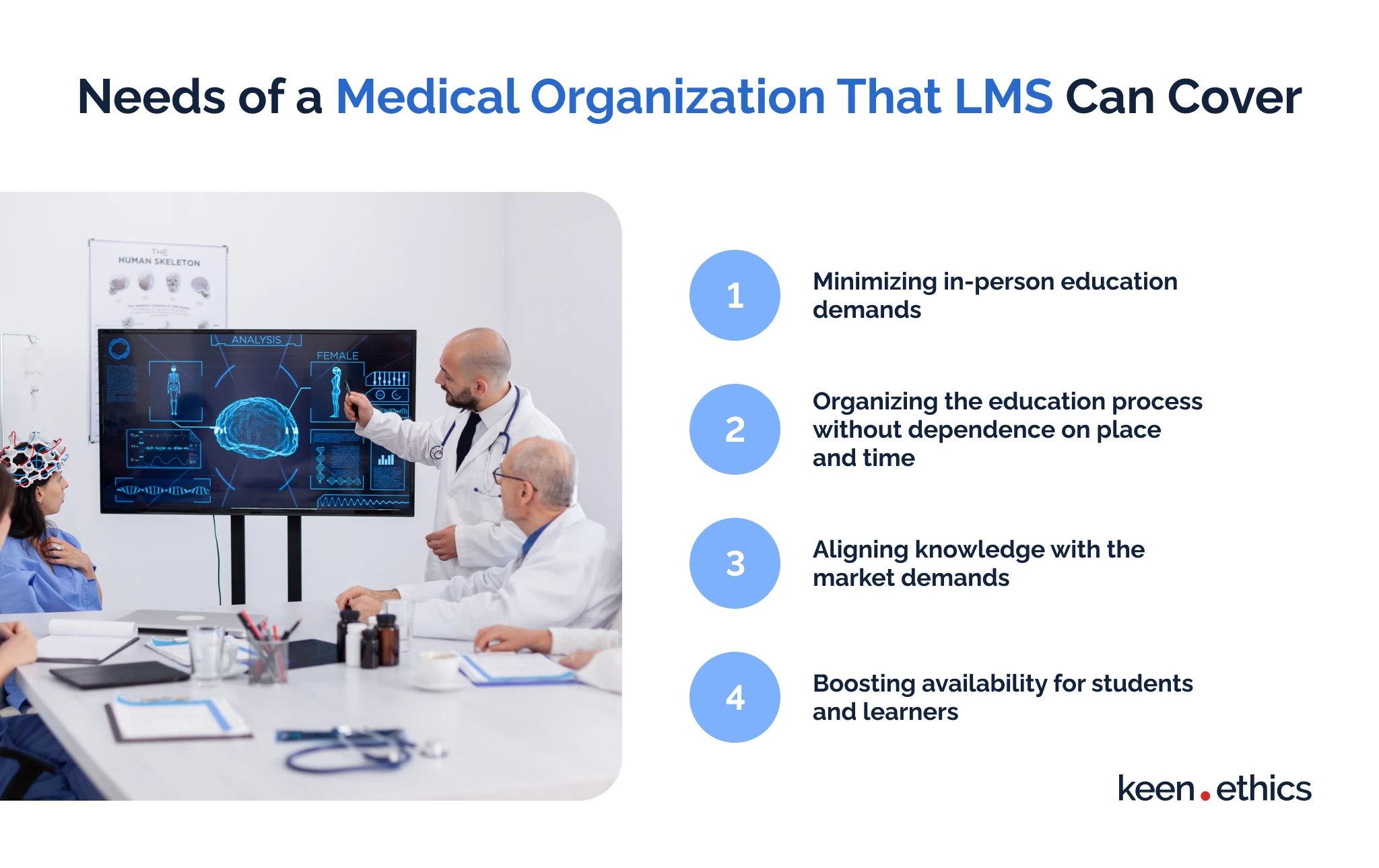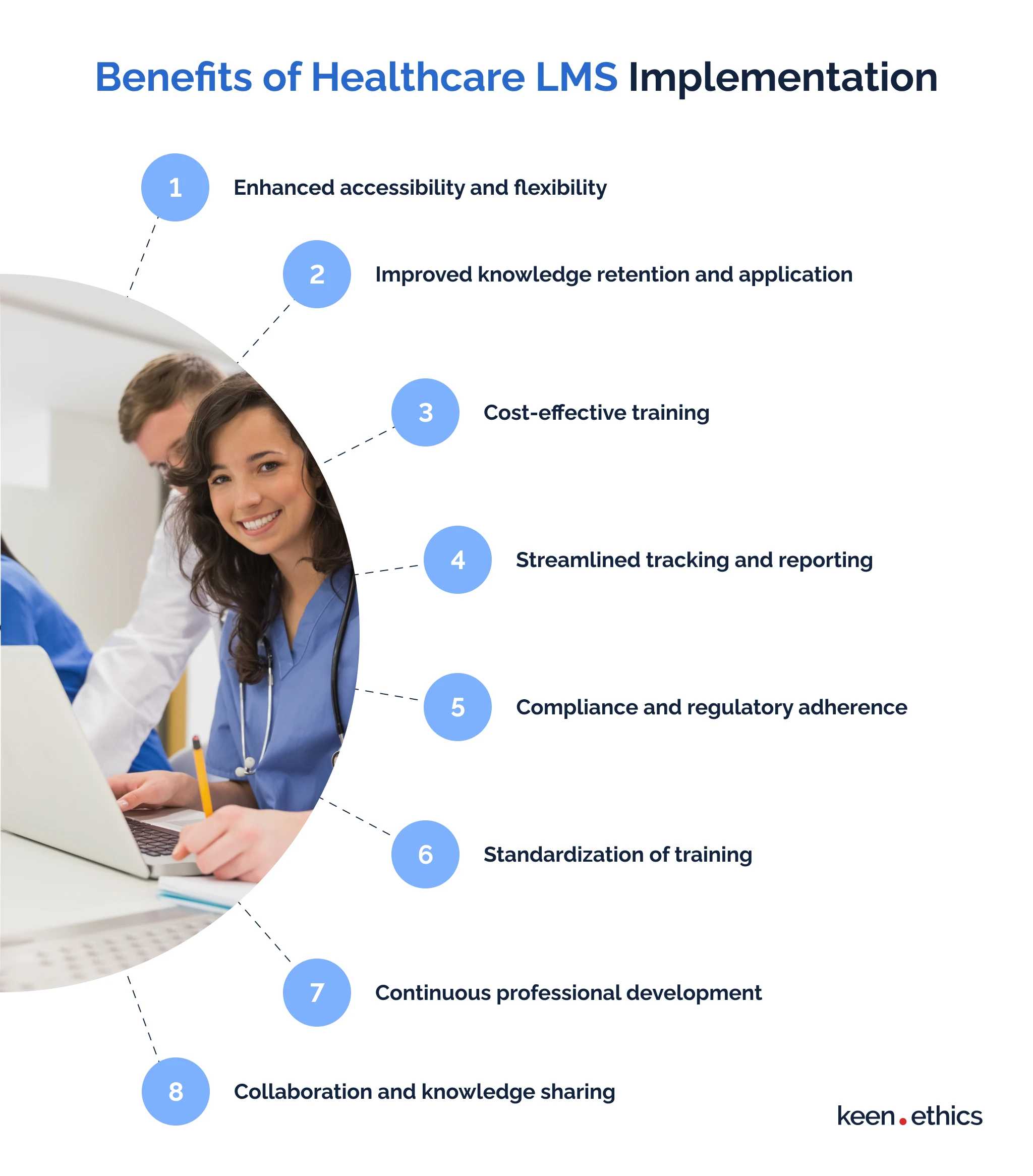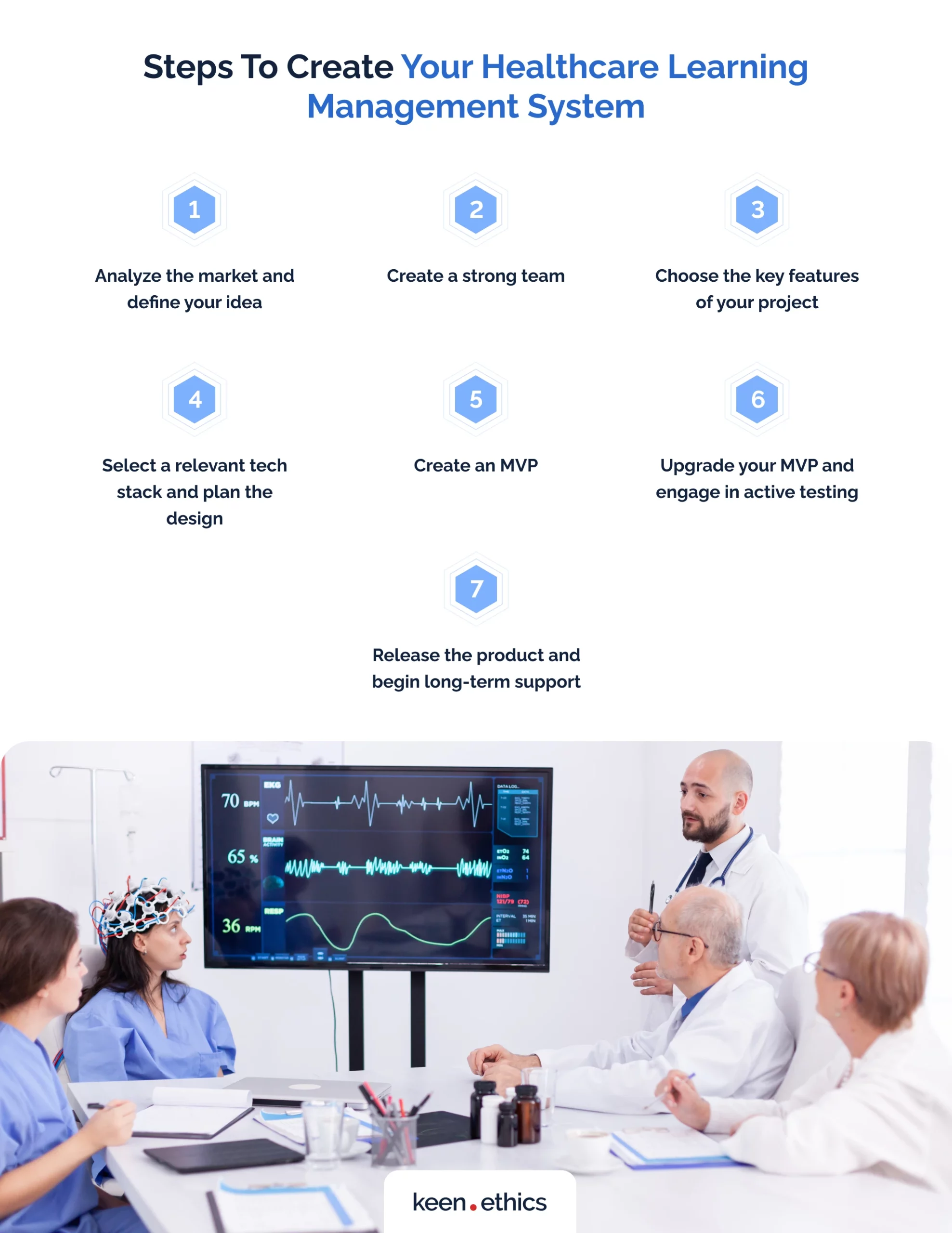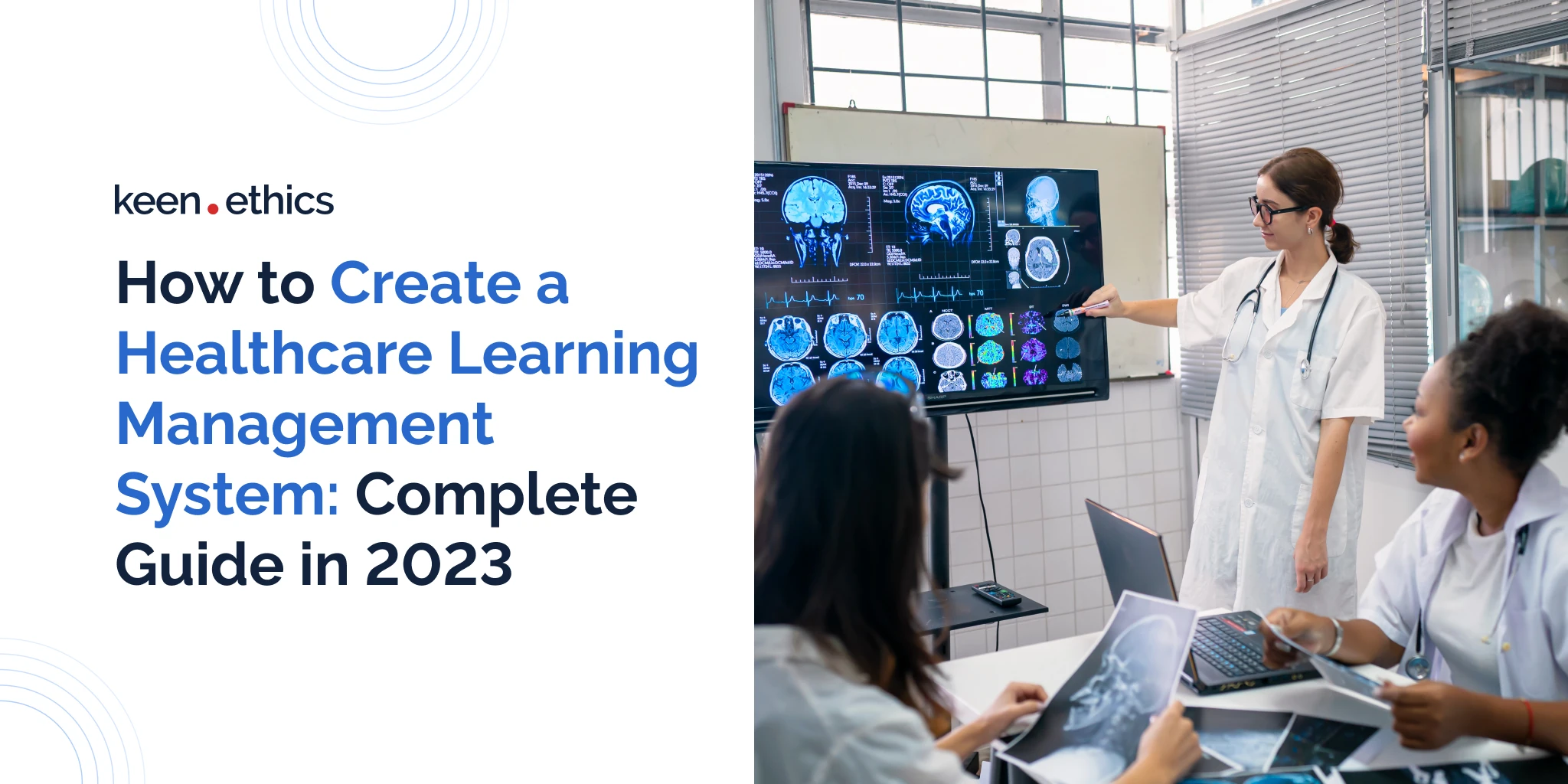Healthcare LMSs can significantly improve the ability of medical specialists to deliver high-quality healthcare. This article looks at all the key aspects you need to consider when creating an LMS for a healthcare facility.
Healthcare is one of the most complex fields for humans to learn. It involves many factors: one must understand treatment strategies, human anatomy, and even microbiology to deliver high-quality services. In this light, every tool that can boost learning should be welcome. This article looks at the concept of LMS for healthcare. What aspects does it touch upon? We review the key definitions and then analyze the benefits of such platforms and how to capitalize on them.
What is LMS in Healthcare?
Before discussing other aspects of LMS, it’s crucial to define this technology and review its key applications in healthcare. According to Paul Kirvan at TechTarget, an LMS stands for Learning Management System, a digital platform for managing and delivering training and education programs. With an LMS in healthcare, you can perform a variety of tasks related to disease treatment. Firstly, you can create and upload online courses and training materials for healthcare professionals, including doctors, nurses, and medical staff. The LMS allows you to organize and deliver these materials in a structured manner, making them easily accessible to learners. Secondly, you can track and monitor learners’ progress, including completion rates and assessment scores. The LMS also enables you to assess and evaluate learners’ performance through quizzes, assignments, and assessments. Additionally, you can communicate with learners, provide feedback, and facilitate discussions and collaboration among healthcare professionals. In short, an LMS is a platform that makes learning as comfortable for the involved individuals as possible.
What Makes Healthcare LMS Different From Others
The definition we gave above is notable for one aspect: it applies to almost every learning management system. However, this article is specifically about LMS for healthcare. What makes such systems unique? Let’s look at the key features to consider. We believe healthcare LMS platforms are specifically designed to meet the unique needs and requirements of the healthcare industry. How?
1) Healthcare LMSs provide extensive libraries of medical content, including courses, modules, and relevant resources to healthcare professionals.
2) These platforms may also offer compliance tracking and certification management to ensure healthcare professionals stay up-to-date with regulatory requirements.
3) Additionally, healthcare LMS platforms can integrate with existing healthcare systems, such as electronic health records (EHRs), to provide a seamless learning experience. They may also address privacy and security concerns related to healthcare data, ensuring compliance with HIPAA regulations.
Related Services
EDUCATION SOFTWARE DEVELOPMENT SERVICES FROM KEENETHICS
Needs of a Medical Organization That LMS Can Cover

Every organization has unique requirements for its functioning. All innovations in the markets are problem-centric: they seek to resolve some specific issues of the potential customers. In this regard, a healthcare LMS isn’t an exception. Every system of such kind resolves a specific problem for its users. How does it do it? Let’s look at the key applications:
Minimizing in-person education demands
The first aspect you need to consider is minimizing demands for in-person education. What’s the key problem of the in-person approach? It demands many resources from everyone. To teach many individuals, one needs several or even dozens of specialists. Creating courses that reach hundreds or even thousands of people is difficult without major funds. Healthcare LMS solves this problem by making it possible to automate many of the common tasks performed by teachers and instructors. One individual can easily manage a course with hundreds of students. As for the students, they don’t have to personally visit a teaching space, according to Emma Rundle, writing for eLearning Industry. We discuss this issue in-depth in the next paragraph.
Organizing the education process without dependence on place and time
Why does this matter? In-person education is too restrictive. One needs to be present in a certain location and spend a pre-established portion of their time there. This factor limits the ability of many people to get a proper education. Many specialists in the healthcare field work with unstable schedules. In this light, they may miss the opportunities to get good instruction due to the absence of stability in their activities. Learning never occurs spontaneously: one must study continuously to achieve high-quality results. The minimization of in-person education demands makes studying without a stable schedule possible. The learners don’t have to visit a single location at a particular time. Instead, they get an opportunity to learn wherever and whenever they want.
Aligning knowledge with the market demands
What’s the problem with traditional learning frameworks? They aren’t only limited in time and place. They also have massive limits regarding content. The availability of teachers limits the number of courses outlining various content. In this light, creating enough content to satisfy all the market requirements is difficult. Healthcare LMS solves this problem by minimizing the number of teachers necessary for managing a course. Without LMSs, a team of five teachers can manage one in-person course. With LMSs, it’s realistic to assume that all five specialists can deliver their content to the learners. This approach is a perfect opportunity to expand the ability to meet market demands. A healthcare learning management system offers an opportunity to greatly widen the amount of content available on the market.
Boosting availability for students and learners
The content of traditional courses (in-house ones) is problematic because it’s difficult to preserve. The information presented during a live lecture that isn’t recorded is unlikely to be preserved in its entirety. For example, many innovative ideas stemming from past scientists are lost because they only appeared in certain lectures and did not receive coverage in articles and books. We find hints of such innovation solely in the records of their students, which are imperfect. Online courses based on Learning Management Systems are less susceptible to such a problem. Why? They’re present in computer systems, which can save tremendous amounts of data. Obviously, such systems can eventually lead to the loss of data, but they will be available to the learners for a much longer time than in the case of traditional learning methods. This factor is great for students because it allows people to access the data they want to revise without barriers and, more importantly, study at their pace. As J. Lynn McBrien from the University of South Florida notes, online-based learning is essential for boosting the accessibility of learning data.
Benefits of Healthcare LMS Implementation

A healthcare learning management system has many benefits. In this regard, we want to list several positives that can influence you:
1) Enhanced accessibility and flexibility: Healthcare LMS allows healthcare professionals to access training materials and courses at their convenience, anytime and anywhere.
2) Improved knowledge retention and application: Interactive and engaging learning modules in healthcare LMS promote better retention and application of knowledge in real-world healthcare scenarios.
3) Cost-effective training: Healthcare LMSs reduce the need for traditional in-person training sessions, saving costs associated with travel, venue, and instructor fees.
4) Streamlined tracking and reporting: LMS in healthcare platforms provide comprehensive tracking and reporting features, enabling organizations to monitor learners’ progress, completion rates, and performance metrics.
5) Compliance and regulatory adherence: Healthcare LMS ensures that healthcare professionals receive mandatory training, certifications, and stay updated with the latest regulations, maintaining compliance with industry standards.
6) Standardization of training: LMS in healthcare implementation allows for consistent delivery of training materials, ensuring all healthcare professionals receive standardized education and knowledge across the organization.
7) Continuous professional development: Healthcare LMS supports ongoing learning and professional growth by offering a wide range of continuing education courses, allowing healthcare professionals to stay updated with the latest advancements and expand their skills.
8) Collaboration and knowledge sharing: LMS platforms foster collaboration among healthcare professionals by providing discussion forums, chat features, and collaborative learning spaces, enabling the sharing of insights, experiences, and best practices for improved patient care.
Steps to Create Your Healthcare Learning Management System

If you’re interested in a healthcare learning management system, you most likely want to create your own solution. Let’s look at the key steps that can help you ensure the creation of a high-quality product. What are those? Here’s the list of the key factors to consider:
Step 1: Analyze the market and define your idea
The first step in the creation of any business project is the study of the market conditions. You have to understand if your app makes sense at all. What’s the key reason to develop a custom LMS? It’s the absence of the necessary functions in other apps. Try to understand what’s available on the market: perhaps, a solution you want to create is already there. In this light, we recommend choosing off-the-shelf solutions. In case there’s no ideal (or near-ideal) choice, transitioning to development is a better choice. Define what app you want to see and start actively developing a relevant solution. As Paul Litman writes for the Jerusalem Post, a lack of business analysis is a major mistake.
Step 2: Create a strong team
A big aspect of many projects is the presence of a good team. People who develop a solution define its quality. You have two options: it’s possible to create your in-house team, or you can go for outsourcing. The benefit of the first solution is the greater control over the development processes. As for the second one, it’s cheaper and offers access to the teams that know how to cooperate well. In this light, we can recommend our company: our specialists know how to work on complex projects such as a healthcare learning management system.
Step 3: Choose the key features of your project
With a team in place, you should transform an overall idea of your project into something more definite. What to do in this stage? You should create an overall outline of your app. You should know what minute features it would have and even have an understanding of its overall design. This stage should involve active brainstorming and even sketching of the user interface aimed at understanding the relevant user experience. The more you understand, the easier it will be to develop a full-scale project.
Step 4: Select a relevant tech stack and plan the design
What’s the key reason to sketch all the key features with such a high level of detail, as mentioned above? This knowledge will help you understand what technologies are the most likely to fit the needs of your project. Different features require diverging programming languages and frameworks. For example, if you want to create a platform that is centered around online use, the best choice is to focus on Node.js. Through its reliance on JavaScript, you can create a project that is scalable and, more importantly, optimized for use in modern web browsers.
Step 5: Create an MVP
With the completion of the planning phase, you can transition toward development. In this respect, the best option is creating the so-called minimum viable product. What is it? It’s a version of the product with the minimum features necessary for comfortable usage. Why use such a framework? The answer is simple: it saves money by helping the developers analyze if their idea makes sense. Ideas, while on paper, may seem rational. However, theoretical assessments are insufficient. Practice is the only way to see if an idea makes sense. MVPs offer such an opportunity.
Step 6: Upgrade your MVP and engage in active testing
If your LMS systems for healthcare succeed in the MVP test, it’s time to bring the project toward completion. You should add some features apart from the core ones and refine the user experience. A vital factor in this stage is active testing. You should remove as many potential problems as possible before going for a release.
Step 7: Release the product and begin long-term support
After you ensure the project has minimal bugs and enough features, it’s time to transition toward a release. Obviously, no release candidate is perfect: one can’t ‘finish’ development; one can only stop at some point that the development team collectively deems good. In this light, it’s crucial to engage in long-term support. Learning management systems in healthcare are likely to attract a lot of feedback. You should consider it to transform your project towards the best standards possible.
How to Choose an LMS Software Development Provider
How to choose the right vendor for hospital learning management systems? Here are the key steps you should look at:
- Identify your specific needs: Determine the specific requirements and goals of your healthcare organization’s LMS, such as compliance tracking, content management, or integration with existing systems. The more you understand your specific needs, the better. Many companies can refuse to cooperate with you if you fail to offer a definite vision of the project you want to create.
- Research reputable providers: Conduct thorough research and gather a list of reputable LMS software development providers specializing in healthcare. Don’t focus on one development team. There are many options on the market, and you should always have multiple companies on your list. Even if some solution seems good on paper, additional research can show better outcomes are possible.
- Review portfolio and experience: Evaluate the providers’ portfolios and case studies to gauge their experience in developing healthcare-specific LMS platforms and their ability to meet your organization’s requirements. Not all players on the market are as good as it may appear. Experience in the market, in general, isn’t enough: one needs specific knowledge. We at Keenethics, for example, have a great portfolio of products you can consider.
- Request demos and trials: Request demos or trials from shortlisted providers to test the user interface, features, and customization options of their LMS platforms. There’s no better way to understand if a company fits your needs than by looking at real projects. This is a perfect insight into the quality and their overall approach to design.
- Consider pricing and support: Compare pricing models and support services offered by each provider, including implementation assistance, training, and ongoing technical support, to ensure a cost-effective and reliable partnership. We recommend focusing on the combination of quality and price. Overly cheap or overly expensive solutions are never the best way to spend your funds.
Conclusion
All in all, learning management systems in healthcare can be a vital addition to every facility. Such systems bring many benefits regarding the spread of vital professional knowledge. Are you interested in creating an LMS? In that case, our company is here to help. You can address us for a free analysis of your project and an estimate of its costs.
FAQ
What popular LMSs exist on the market?
Some popular LMSs on the market include Moodle, Canvas, Blackboard, Brightspace, Cornerstone, and SAP Litmos.
How can an LMS impact the clinical market?
An LMS can impact the clinical market by providing efficient and accessible training, improving knowledge retention, and enhancing healthcare professionals’ skills.
What types of LMS exist on the market?
Different types of LMSs include cloud-based LMS, open-source LMS, mobile LMS, corporate LMS, academic LMS, and healthcare-specific LMS.
What influences the cost of an LMS system?
Factors influencing the cost of an LMS system include features and functionality, user licenses, customization requirements, hosting options, and support services.
If you want to develop one for your service, our company is here to help. Don’t hesitate to contact us: we can offer a high-quality estimate of your project.

























